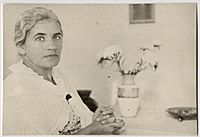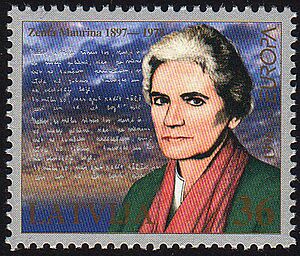Zenta Mauriņa facts for kids
Quick facts for kids
Zenta Mauriņa
|
|
|---|---|

Zenta Mauriņa (1930)
|
|
| Born | 15 December 1897 Lejasciems, (Now |
| Died | 25 April 1978 (aged 80) Basel, |
| Occupation | writer, essayist |
| Nationality | Latvian |
| Genre | Prose |
| Spouse | Konstantīns Raudive |
Zenta Mauriņa was a famous Latvian writer and essayist. She also studied languages and literature deeply. Zenta was born on December 15, 1897, and passed away on April 25, 1978. She was married to Konstantin Raudive, who researched unusual sound phenomena.
Contents
Zenta Mauriņa's Life Story
Early Life and Education
Zenta Mauriņa was born to a doctor named Roberts Mauriņš. She spent her early years in a town called Grobiņa. When she was just five years old, Zenta became ill with polio. This illness meant she would use a wheelchair for the rest of her life.
Despite this, Zenta was very determined. She went to a Russian girls' high school in Liepāja from 1913 to 1915. After that, she moved to Riga to study at the Latvian University. She first studied philosophy from 1921 to 1923. Then, she focused on the philology of Baltic languages from 1923 to 1927. Philology is the study of language in historical and cultural ways.
Teaching and Doctorate
Zenta Mauriņa became a teacher. She taught at the Latvian Teachers Institute. She also taught at the Latvian University in Riga and in Murmuiza. In 1938, she earned her doctorate degree in philology. Her research focused on the writings of a Latvian poet and thinker named Fricis Bārda.
Life in Exile
Near the end of World War II, Zenta Mauriņa had to leave her home country. This is called going into exile. She first went to Germany. Later, she moved to Sweden. In Sweden, she became a lecturer at Uppsala University. She taught there from 1949 to 1963.
In 1966, Zenta moved to Bad Krozingen in southern Germany. She lived there until she passed away. She died in a hospital in Basel, Switzerland, and was buried in Bad Krozingen.
Zenta Mauriņa's Books
Books Published in Latvia
Before 1944, Zenta Mauriņa published 19 books in Latvia. These books included detailed studies about other Latvian writers. She wrote about Rainis, Jānis Poruks, Anna Brigadere, and Fricis Bārda. She also wrote about famous international writers like Fyodor Dostoyevsky and Dante Alighieri. During this time, she also wrote her novel, Life on a Train, which came out in 1941.
Books Published After the War
After World War II, Zenta Mauriņa continued to write many books. She published 20 books in Latvian. She also wrote 27 books in German. Her works became very popular and were translated into many languages. People could read her books in Italian, English, Russian, Swedish, Dutch, Finnish, and Danish.
Some of her well-known books in German include:
- The Long Journey (Die weite Fahrt) – This book tells her own life story.
- A Prophet of the Soul: Fyodor Dostoievsky – This is a biography about the writer Fyodor Dostoievsky.
- Heart Mosaic (Mosaik des Herzens) – This book is a collection of essays.
- In the beginning, was joy (Im Anfang war die Freude) – This book contains short stories.
- A loved life – a lived life (Geliebtes Leben – gelebtes Leben) – Another collection of her essays.
- A Portrait of Russian Writers (Porträts russischer Schriftsteller) – More essays about Russian authors.
Awards and Honors
Zenta Mauriņa received several important awards for her writing and contributions:
- Officer Cross, of the Order of Merit of the Federal Republic of Germany (1968)
- PBLA (World Free Latvians Association) Award (1969)
- Konrad Adenauer Prize for literature (1971)
- Honorary citizen of Bad Krozingen (1977)
See also
 In Spanish: Zenta Mauriņa para niños
In Spanish: Zenta Mauriņa para niños


